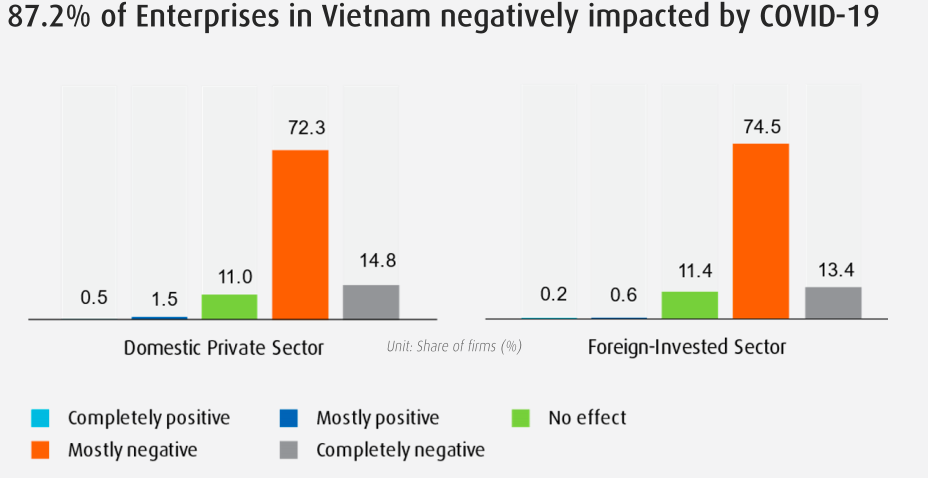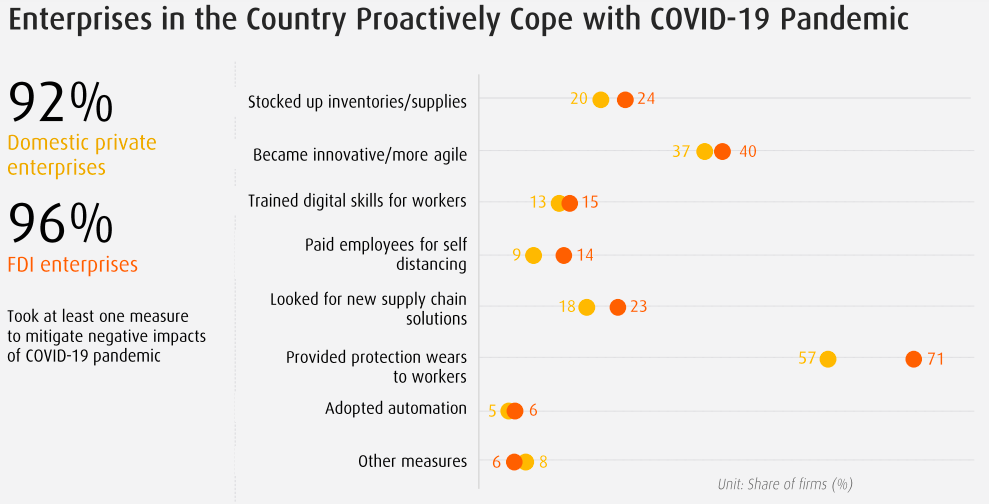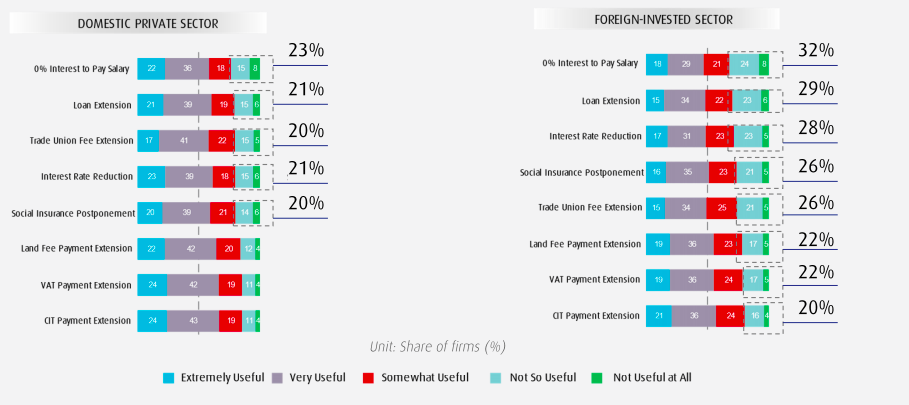Nearly 90% of businesses in Vietnam hurt by Covid-19 pandemic
Although the pandemic has negatively affected most businesses in Vietnam, many have demonstrated a high capacity to rebound after the lifting of the nationwide lockdown at end of April 2020, said a World Bank’s expert.
The Covid-19 pandemic outbreak took its toll on the business community in Vietnam, as 87.2% of them suffering from “mostly" or "completely negative" impacts.
The information was unveiled at the online launch of the report on Covid-19 impacts on Vietnamese businesses jointly produced by the Vietnam Chamber of Commerce and Industry (VCCI) and the World Bank on March 12.
“The most severely affected ones are businesses that have been in operation for less than three years, micro and small companies or those operating in the Central Coast,” stated the report, noting both domestic private companies and foreign direct invested (FDI) companies were adversely affected.
Private companies in some sectors experienced a harder hit by the pandemic, including garment and textile (97%), information and communication (96%), and manufacturing of electrical equipment (94%).
Meanwhile, it has struck a stronger blow to FDI companies in a number of sectors, including real estate (100%), information and communication (97%), agriculture/fishery (95%).
According to the report, the Covid-19 pandemic hindered businesses from reaching out to their customers, caused disruptions to supply chains or employment of workers, and incurred additional costs for Covid-19 prevention.
| Laid-off workers account for 30% of enterprises' employment. |
Many companies faced business interruption and shutdown due to the pandemic, even standing on the verge of bankruptcy due to the sudden decline in demand. Some reported that they had to delay and extend their investment schedule, or even cancel their ongoing or future projects.
Due to Covid-19, as many as 65% private businesses and 62% FDI businesses experienced a reduction in turnover in 2020 vis-a-vis 2019. On average, the turnover declined by 36% among private companies and 34% among FDI firms. Micro, small, and medium-sized firms recorded a higher drop in turnover on average compared with larger ones.
“Although the pandemic has negatively affected most businesses in Vietnam, many have demonstrated a high capacity to rebound after the lifting of the nationwide lockdown at end of April 2020”, said Jacques Morisset, Lead Economist for the World Bank in Vietnam.
“They have adjusted their business model, especially by accelerating their adoption of digital technologies, by responding to the demand of local customers, and by strengthening their position in global value chains. To sustain this transformation, smart and effective support from the government will be needed in both the short to longer terms”.
Business response to the pandemic
A majority of firms have taken one or more actions to respond to the Covid-19 outbreak. The most common action is to provide personal protective equipment to their workers, as reported by 57% of private businesses and 71% of FDI businesses. This is followed by adoption of new and more flexible work arrangements (as shared by 37% of private businesses and 40% of FDI businesses).
Stockpiling of finished goods and raw materials is another solution chosen by many businesses (20% of private businesses and 24% of FDI businesses). Some firms have been looking for new solutions/alternative supply chain (16% of private businesses and 24% of FDI businesses). Approximately 13% of private businesses and 15% of FDI businesses have provided their workers with digital skills training for online work arrangements.
Business views on government support policies in response to Covid-19
Survey findings showed that a number of policies such as deferral of corporate income tax payments and of value-added tax payments are generally more accessible. Full interest subsidy for loans to cover the employee's paycheck is seen as the most inaccessible policy.
| The majority of enterprises react positive to government's efforts in dealing with Covid-19 |
By ownership, large or medium-sized private domestic firms reported easier access to support policies. The three policies with highest business ratings in terms of relevance are deferral of value-added tax payments, corporate income tax payments, and land rent payments. Despite reported difficulties in access to the zero-interest loans to cover the employee's paycheck, surveyed companies spoke highly of this policy. The findings showed that a firm with easier access to information about a supporting policy was more likely to give a higher rating to its relevance.
“Vietnamese businesses have been through a tough year 2020 due to Covid-19, but we have seen remarkable resilience of the business community. In 2021, there remain challenges for businesses and authorities at all levels; in addition to supports to be made available to affected businesses, it is needed to introduce support policies in ways that help businesses survive and thrive after Covid-19, especially in terms of innovation, high-quality human resources training and readiness for new competition,” said VCCI Chairman Vu Tien Loc.
“This will be key for businesses to explore opportunities in a new context and for the economy to recover and record a higher level of development,” he noted.
Business recommendations
Along with the continued delivery of the current support policies, many businesses also suggested that the government, ministries and local authorities further share information on available support policies, and strongly simplify administrative procedures, criteria, conditions while ensuring fairness in access to government supports.
Many businesses would like to see stronger administrative reforms and more efficient law enforcement to build an enabling business environment - this will be critical to drive the sustainable business recovery in the global pandemic aftermaths.















